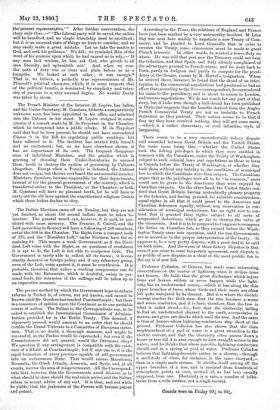There seems to be a very uncomfortable fishery dispute still
unsettled between Great Britain and the United States, the main issue being this, — whether the United States took the fishing privileges to which they were entitled in common with the Canadians, under the Treaty of Washington, subject to such colonial laws and regulations as those in force in Canada before the Treaty of Washington, or whether they took them without any liability to the conditions of municipal law to which the Canadians were then subject. The Canadians argue that as the privileges were all to be "in common," more could not be given to the Americans than were enjoyed by Canadian subjects. On the other hand, the United States con- tend that Great Britain having undoubtedly plenary property in the fisheries, and having granted, for valuable consideration, equal rights in all that it could grant to the American and Canadian fishermen equally, without any reservation in con- sideration of municipal restrictions, has no right now to con- tend that it granted these rights subject to all sorts of unspecified deductions, which go far to destroy the value of the concession. And it is to be proposed to Congress to reimpose the duties on Canadian fish, as they existed before the Wash- ington Treaty came into operation, until the two Governments are in accord as to the proper interpretation of the treaty. It appears to be a very pretty dispute, with a good deal to be said on both sides. And the worst of these fishery disputes is that even if you come to some temporary agreement, each dispute is SA prolific of new disputes as a shoal of the most prolific fish in the sea is of new fish.


































 Previous page
Previous page